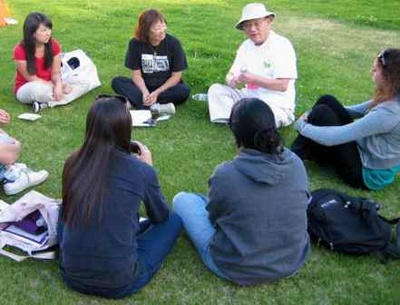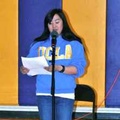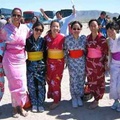Dear Grandma,
Every time I talk to you on the phone, I tell you about all the things I do with the UCLA Nikkei Student Union (NSU), right? I have yet another NSU story for you. Yesterday, a bunch of us from UCLA went on the 41st Annual Manzanar Pilgrimage. My friends who have been on the Pilgrimage before told me that it would be a great experience; I didn’t expect it to be as amazing as it actually was.
I don’t think I ever told you this before, but when I was in elementary school, every time you talked about “camp” with your friends, or the other grandmothers, or the strangers at Marukai, I always thought that you were talking about summer camp. You would always tell stories about classes and playing with friends. Once you found out that I learned about Japanese American Internment in my California History class, you and all the other grandparents started passing along your books and pictures of barracks in the desert, mess halls, and lots and lots of Japanese Americans. The black-and-white-photo-filled books were interesting at first, but eventually I stopped looking at them. You gave them to me, and I put them on my bookshelf without ever reading the first chapter.
It wasn’t that I wasn’t interested. It was that I didn’t understand it. The camps that were described in the books sounded like horrible places. The Poston block that you grew up on sounded like something completely different. You always said camp was fun. You are still friends with people you made in camp. Wasn’t it better than being in San Luis Obispo, where everyone would see you as the enemy? I was convinced that authors of the books were just being dramatic.
Going to Manzanar gave me a completely different perspective. The car ride was really, really long. I fell asleep, and when I woke up, there was nothing but dirt and mountains around. And we were still in California. How scary was it to be in the middle of nowhere and not know where you were going, or what was going to happen to you? Your Dad was taken somewhere else, right? Weren’t you worried that if you ended up in the middle of the desert, he wouldn’t be able to find the rest of your family again?
Manzanar looked exactly how I expected it to look, but in color. The mountains there are beautiful, and the sky is really clear. I saw my first starry sky last night. But now I can understand how difficult it must have been to live out there. It’s dry and hot like the San Fernando Valley, but there’s no air conditioning or shade to keep cool in. I felt really guilty yesterday because I kept complaining.
“It’s so hot…we have to walk so far.”
We were only out under the sun for a couple of hours. Internees like you had to live under that sun for years. How can I complain about weather in the Valley after knowing that internees had to live through heat and cold and wind. I’m really spoiled, huh?
My favorite part of the day program was when everyone danced Tanko Bushi and One Plus One together at the cemetery. You know that I’m always up to dance ondo, and I do odori all the time. But this time, it really felt different. It made me remember why I love ondo dancing in the first place; everyone, an entire community, can be brought together by a small number of moves. It sounds cheesy, but I was really happy to be able to teach those dancing next to me a dance that is important in both Japanese and Nikkei culture.

Jaymie Takeshita (background left) and Kerry Cababa (background center) listen as former internee Sam Shimada (background right) tells his story in a small group discussion at the Manzanar At Dusk program, held at Lone Pine High School on April 24, 2010. Photo: Gann Matsuda
My favorite part of the entire day was a program called Manzanar At Dusk where we were able to have small group discussions with people from all over the place, including an internee named Sam Shimada.
He said that he only talked about the good things about camp with his grandchildren, just like you did with me. As the only Yonsei in our group, I was really happy to be able to share what I knew about camp with the others in the group whose grandparents weren’t in camp. All of those books that I skimmed over and stories that you told during our Christmas parties were really helpful. Thank you!!
Mr. Shimada told us that he hoped that we could gain something, even if it was small, from the discussion. I gained so much more than that. He reminded us that the camp experience for people who were young children, like you were, was different from that of the adults. He reminded us that there were things about camp that he didn’t want to talk about with his children or grandchildren, but talking in these group discussions helps him talk to his own family about it.
Our group discussion leader, Kerry Cababa, looked at me and said, “Keep asking.”
At first, I couldn’t figure out why she looked at me. It took me a few seconds to realize that it was a reminder that I need to take advantage of every opportunity I get to learn something about Japanese American History—about our family history. If the Sansei and Yonsei don’t know or care to listen to the Nisei’s stories, everything will be forgotten.
A high school student in my discussion group called Mr. Shimada a hero. She said that she admired Japanese Americans for being able to experience something like that. I never thought of the Nisei as heroes up until now, but she’s right. Yesterday, I realized that I know so many heroes. The time before camp, during camp, after camp….it was all difficult, right? I don’t think I could have handled it. But the Issei and Nisei made the best of the situation. All of you helped form what it means to be Nikkei today. In the past few years, being Nikkei has become a big part of how I identify myself. What would we be without the Issei and Nisei?
A couple of years ago, I asked Grandpa for more information about his parents and their life in Japan when I was writing a paper for Japanese school. He said he didn’t know anything other than the most basic information: where they lived, what they did. My Mom always says that she regretted not being able to speak Japanese because she couldn’t talk to your Mom. When she talks about obaa-chan, she usually says, “She tried so hard to talk to us and I couldn’t understand anything.”
I don’t have the language barrier as an excuse. I don’t have any excuses. I simply didn’t make a real effort to know. Yesterday, I realized that I can’t let it be like that. Just as Ms. Cababa said, I need to keep asking. The least I can do for the internees who sacrificed and experienced so much is to remember their stories.
I’m sorry for only listening to half of your stories. I’m sorry that I let the books you bought for me get dusty in my messy bedroom. Even though I probably know more about your camp experiences than my parents do, there’s still so much that I don’t know. There are still so many stories that I want you to tell me. The next time we get together, do you mind pulling out your old albums and showing them to me one more time?
I’ll come visit you soon. Of course I want to hear the same old stories again, but I also want to hear new ones. What was scary? What was difficult? Was school hard? Was it weird to be around Japanese people all of the time? What did you do after camp? I know we’re both busy, but let’s try to make some time for each other. I don’t want to feel how my Mom feels today. I want to be able to know and share these stories of real heroes.
*This was originally published on the Official Blog of the Manzanar Committee on May 4, 2010.
© 2010 Jaymie Takeshita




